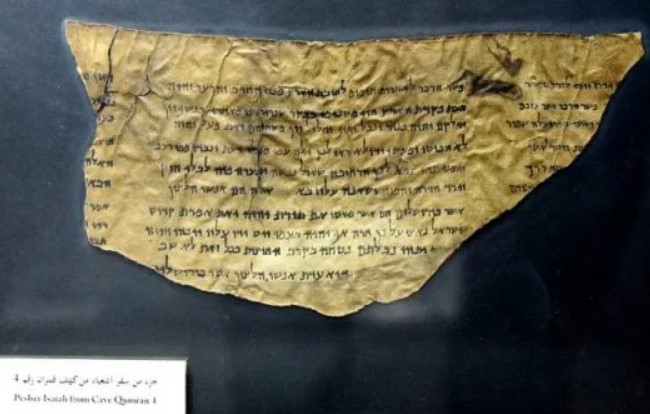First, we begin with a quick view of the fragment found at Qumran in what are referred to as the Dead Sea Scrolls – the single most corroborated text in the world:

As we look closely at this picture, we discover a complete absence of vowel sounds:

Marked is the YHVH which is set forth completely without vowel sounds.
Now, let’s take a look at the Torah of Mosheh:
Devariym (Deuteronomy) 4:1-2
NOW therefore hearken, O Yashar’el, unto the statutes and unto the judgments, which I teach you, for to do them, that ye may live, and go in and possess את eth-the land which Yahuah Elohai of your fathers gives you. 2 Ye shall not add unto the word which I command you, neither shall ye diminish ought from it, that ye may guard את eth-the commandments of Yahuah Elohaykem which I command you.
Let’s talk about the nikkud, shall we?
According to Dictionary.com, nikkud [nee-kood] plural nik·ku·dim, is any of the combinations of dots and lines sometimes placed above or below Hebrew consonant symbols to indicate the pronunciation of vowels accompanying and usually following the consonants; vowel point.
According to “Learn Hebrew with Ken” nikkud is a system of dots and lines that represent pronunciation differences in Hebrew.
According to Wiktionary.com, nikkud is the system of optional diacritics attached to Hebrew letters that indicate vowels and consonant variations.
However, Strong’s H5350 declares nikkud (נִקֻּד) to mean a crumb (as broken to spots); also a biscuit (as pricked).
Let’s take a look at the Torah passage that we cited above as it appears in the Masoretic text, to see whether or not crumbs, or optional diacritic marks, or dots and lines, have been added to the text:
De 4:1 וְעַתָּה יִשְׂרָאֵל שְׁמַע אֶל־הַחֻקִּים וְאֶל־הַמִּשְׁפָּטִים אֲשֶׁר אָנֹכִי מְלַמֵּד אֶתְכֶם לַעֲשׂוֹת לְמַעַן תִּחְיוּ וּבָאתֶם וִירִשְׁתֶּם אֶת־הָאָרֶץ אֲשֶׁר יְהוָֹה אֱלֹהֵי אֲבֹתֵיכֶם נֹתֵן לָכֶם׃
De 4:2 לֹא תֹסִפוּ עַל־הַדָּבָר אֲשֶׁר אָנֹכִי מְצַוֶּה אֶתְכֶם וְלֹא תִגְרְעוּ מִמֶּנּוּ לִשְׁמֹר אֶת־מִצְוֺת יְהוָֹה אֱלֹהֵיכֶם אֲשֶׁר אָנֹכִי מְצַוֶּה אֶתְכֶם׃
It looks loaded with vowel sounds on every word! Each mark – each nikkud – violates the express teaching of this passage.
Let us therefore reach our ultimate conclusion: the application of the nikkud violates Mosheh’s Torah!
Now, let’s see how Strong’s handles the tetragrammaton (YHVH):
Strong's H3068 (יְהֹוָה) . . .
Wait just a minute! Do you see nikkud placed on the sacred name? I sure do. But it is from this blatant violation of the Torah command not to add to nor diminish from that we arrive at the Masoretic selection for the pronunciation of the sacred name as Yehovah (Yᵉhôvâh).
So, who and when were the Masoretes? According to one source, Encyclopedia Britannica (https://www.britannica.com/topic/biblical-literature/Types-of-biblical-hermeneutics#ref598296) the Masoretes were a Babylonian sect, who, beginning in the Middle Ages, (6th–10th century), fixed in writing, by points and annotation, their pronunciation, punctuation, and (to some extent) interpretation of the biblical text. Their work is found
According to the Aleppo Codex.org, the “Masoretes worked to determine the text of the Bible. They stated the proper way of writing and reading the Bible; and in passages where they found differences between texts and ways of reading, they issued a decision and ruled as to which opinion was correct. These decisions related not only to verses and words, but to every single letter.” [Italics added].
“The Masoretes decided how to write every single word [italics added] in every place in the Bible. For example, the word קולות (qolot – voices, sounds) was to be written with defective spelling [italics added], without either of the two vavs, in Shemoth (Exodus) 9:28 “the voices (קלת) of the Lord and hail.” A few verses later, it was to be written with a vav after the lamed: “and the voices ([ה]קלות) and the hail ceased” (Shemoth (Exodus 9:33)). In contrast, in another verse in Shemoth (Exodus), it was to be written with a vav before the lamed: “and all the people saw the voices ([ה]קולת)” (Shemoth (Exodus) 20:14).”
We note here, that all of the changes made as cited in the paragraph above, were changes made to Mosheh’s Torah!
Yirmeyahu (Jeremiah) 8:8-10
How do ye say, We are wise, and the Torah of Yahuah is with us? Lo, certainly the lying pen of the scribes has made it a lie. 9 The wise men are ashamed, they are dismayed and taken: lo, they have rejected the Word of Yahuah; and what wisdom is in them? 10 Therefore will I give את eth-their women unto others, and their fields to them that shall inherit them: for everyone from the least even unto the greatest is given to covetousness, from the prophet even unto the priest every one deals falsely.